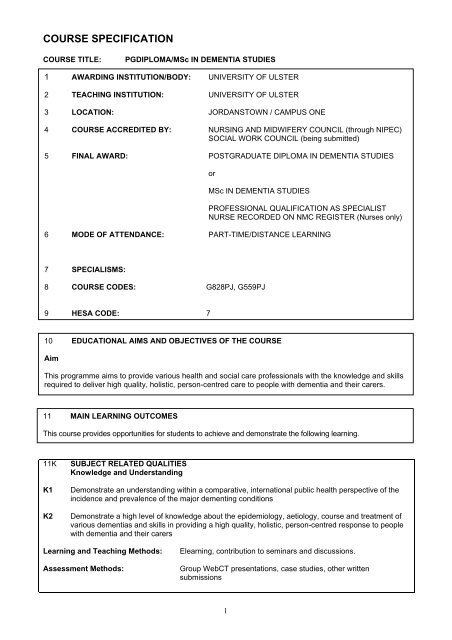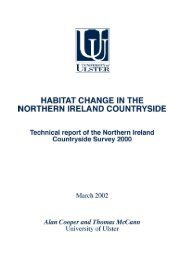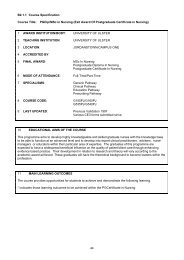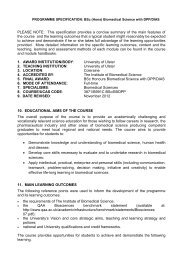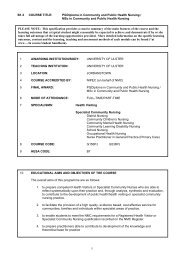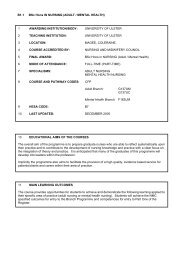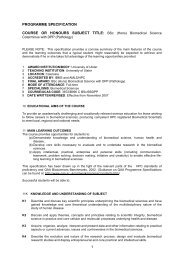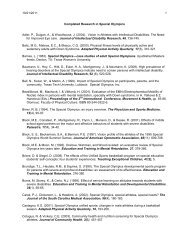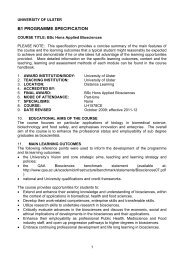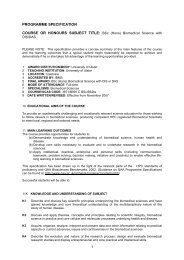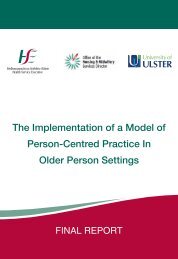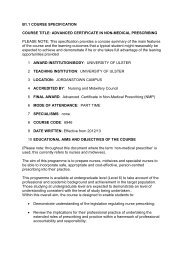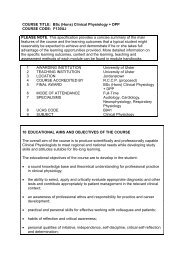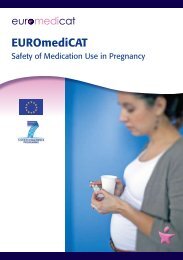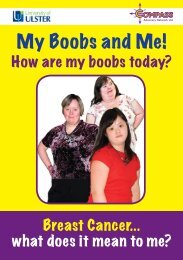COURSE SPECIFICATION - University of Ulster
COURSE SPECIFICATION - University of Ulster
COURSE SPECIFICATION - University of Ulster
Create successful ePaper yourself
Turn your PDF publications into a flip-book with our unique Google optimized e-Paper software.
<strong>COURSE</strong> <strong>SPECIFICATION</strong><br />
<strong>COURSE</strong> TITLE:<br />
PGDIPLOMA/MSc IN DEMENTIA STUDIES<br />
1 AWARDING INSTITUTION/BODY: UNIVERSITY OF ULSTER<br />
2 TEACHING INSTITUTION: UNIVERSITY OF ULSTER<br />
3 LOCATION: JORDANSTOWN / CAMPUS ONE<br />
4 <strong>COURSE</strong> ACCREDITED BY: NURSING AND MIDWIFERY COUNCIL (through NIPEC)<br />
SOCIAL WORK COUNCIL (being submitted)<br />
5 FINAL AWARD: POSTGRADUATE DIPLOMA IN DEMENTIA STUDIES<br />
or<br />
MSc IN DEMENTIA STUDIES<br />
PROFESSIONAL QUALIFICATION AS SPECIALIST<br />
NURSE RECORDED ON NMC REGISTER (Nurses only)<br />
6 MODE OF ATTENDANCE: PART-TIME/DISTANCE LEARNING<br />
7 SPECIALISMS:<br />
8 <strong>COURSE</strong> CODES: G828PJ, G559PJ<br />
9 HESA CODE: 7<br />
10 EDUCATIONAL AIMS AND OBJECTIVES OF THE <strong>COURSE</strong><br />
Aim<br />
This programme aims to provide various health and social care pr<strong>of</strong>essionals with the knowledge and skills<br />
required to deliver high quality, holistic, person-centred care to people with dementia and their carers.<br />
11 MAIN LEARNING OUTCOMES<br />
This course provides opportunities for students to achieve and demonstrate the following learning.<br />
11K<br />
K1<br />
K2<br />
SUBJECT RELATED QUALITIES<br />
Knowledge and Understanding<br />
Demonstrate an understanding within a comparative, international public health perspective <strong>of</strong> the<br />
incidence and prevalence <strong>of</strong> the major dementing conditions<br />
Demonstrate a high level <strong>of</strong> knowledge about the epidemiology, aetiology, course and treatment <strong>of</strong><br />
various dementias and skills in providing a high quality, holistic, person-centred response to people<br />
with dementia and their carers<br />
Learning and Teaching Methods:<br />
Assessment Methods:<br />
Elearning, contribution to seminars and discussions.<br />
Group WebCT presentations, case studies, other written<br />
submissions<br />
1
11I<br />
I1<br />
I2<br />
I3<br />
I4<br />
I5<br />
INTELLECTUAL QUALITIES<br />
Evaluate alternative approaches to understanding and meeting the needs <strong>of</strong> this client group<br />
Explore and evaluate the contribution <strong>of</strong> evidence-based practice in various dementia care services<br />
such as hospitals, nursing and residential homes, day care and domiciliary care<br />
Analyse and evaluate legal and ethical issues pertaining to the care <strong>of</strong> people with dementia and<br />
their carers and to be competent in balancing rights and risks<br />
Analyse and evaluate the importance <strong>of</strong> demographic, organisational, financial, geographical and<br />
political factors on the delivery <strong>of</strong> dementia services, particularly those factors relevant to the region<br />
in which the student presently works<br />
Contribute effectively to policy formulation, service planning and delivery, and quality enhancement<br />
through application <strong>of</strong> a thorough understanding <strong>of</strong> contemporary developments, design and<br />
technology in dementia care services, and issues unique to dementia service provision in region in<br />
which the student presently works<br />
I6 MSc Plan and undertake a research project and prepare this for dissemination either in the form<br />
only <strong>of</strong> a paper suitable for publication in an academic journal or as a dissertation<br />
Learning and Teaching Methods:<br />
Assessment Methods:<br />
Elearning, contribution to seminars and discussions, group and<br />
individual supervision for MSc dissertation, pr<strong>of</strong>essional practice<br />
Group WebCT presentations, case studies, dissertation, clinical<br />
assessment (where appropriate)<br />
11P<br />
P1<br />
P2<br />
P3<br />
P4<br />
PROFESSIONAL/PRACTICAL SKILLS<br />
Within the client’s social context, contribute fully to the assessment <strong>of</strong> the client through initial<br />
generic assessment, specialist assessment by a specific discipline, the use <strong>of</strong> differential physical<br />
and psychological tests and measurement tools, and be able to make appropriate referrals<br />
Help the person with dementia to achieve their personal goals through various interventions such as<br />
information, counselling, advice, support, occupation and social stimulation and referral<br />
Practice and evaluate an experimental, open-minded approach to environmental interventions<br />
designed to enhance the quality <strong>of</strong> life <strong>of</strong> an individual with dementia, the family and pr<strong>of</strong>essional<br />
carers<br />
Provide pr<strong>of</strong>essional leadership, mentoring, supervision and support within a multi-pr<strong>of</strong>essional<br />
perspective to dementia care colleagues<br />
Learning and Teaching Methods:<br />
Assessment Methods:<br />
Elearning, contribution to seminars and discussions, group and<br />
individual supervision for MSc dissertation, pr<strong>of</strong>essional practice<br />
Group WebCT presentations, case studies, dissertation, clinical<br />
assessment (where appropriate)<br />
2
11T<br />
T1<br />
T2<br />
T3<br />
T4<br />
T5<br />
T6<br />
TRANSFERABLE/KEY SKILLS<br />
Demonstrate the skills to work co-operatively and effectively across pr<strong>of</strong>essional boundaries in<br />
planning a uni and multi-pr<strong>of</strong>essional response to the needs <strong>of</strong> the person with dementia and their<br />
carers<br />
Critically reflect on the effects <strong>of</strong> values, beliefs and pr<strong>of</strong>essional allegiances on the delivery <strong>of</strong> care<br />
to people with dementia<br />
Explore and value the contribution <strong>of</strong> family carers and enhance their wellbeing and ability to cope<br />
with living with and caring for a person with dementia by providing information, education, training,<br />
counselling, advice and support<br />
Challenge current thinking and practice in relation to organisational, environmental and societal<br />
changes required to provide person-centred care to people with dementia and their families<br />
Critically assess the merits and demerits <strong>of</strong> an entrepreneurial approach to service planning and<br />
delivery<br />
Utilize the skills <strong>of</strong> innovation to demonstrate an understanding <strong>of</strong> how to plan, resource and<br />
implement new service initiatives<br />
Learning and Teaching Methods:<br />
Assessment Methods:<br />
Elearning, groupwork in preparation <strong>of</strong> presentations, contribution<br />
to seminars and discussions, pr<strong>of</strong>essional practice<br />
Group WebCT presentations, case studies, dissertation, clinical<br />
assessment (where appropriate)<br />
Learning and Teaching Methods:<br />
Students will be expected to take responsibility for their own learning, with the support <strong>of</strong> academic staff and<br />
clinical mentors for those aiming for a pr<strong>of</strong>essional qualification. .<br />
Elearning is the major method for presentation <strong>of</strong> most <strong>of</strong> the theoretical content in this programme.<br />
Students will be provided with the necessary guidance to use this approach effectively and informed about<br />
technical support. Progress will be monitored through regular web-based discussion/ seminars.<br />
Development <strong>of</strong> an understanding <strong>of</strong> the contribution to care <strong>of</strong> individuals with dementia and their carers <strong>of</strong><br />
the different members <strong>of</strong> the multidisciplinary team will be promoted through groupwork. This will be carried<br />
out primarily through elearning based discussions. In addition, regular face-to-face sessions will be<br />
available for discussion <strong>of</strong> issues arising from students’ individual areas <strong>of</strong> practice.<br />
Clinical Practice. The role <strong>of</strong> the mentor is central to the development <strong>of</strong> competence in clinical practice for<br />
those nurses undertaking the Specialist Practice programme for a recorded qualification on the NMC<br />
Register. The mentor will teach, guide and support students in the achievement <strong>of</strong> clinical competencies.<br />
He/she will also monitor development <strong>of</strong> competencies and record successful achievement.<br />
Assessment Methods:<br />
Assessment methods are described in more detail in relation to each module. The methods used include:<br />
Summative Assessment<br />
• Examination<br />
• Written submissions such as case studies, essays etc.<br />
• Certification <strong>of</strong> successful completion <strong>of</strong> practice competencies<br />
3
11 MODULE OUTCOME MAP<br />
Please Note: The matrix displays only the main measurable outcomes. There may be other outcomes detailed in the module descriptions (eg attitudes and<br />
behaviours) which are not assessed.<br />
MODULE<br />
TITLES CODE<br />
LEARNING OUTCOMES<br />
K1 K2 I1 I2 I3 I4 I5 I6 P1 P2 P3 P4 T1 T2 T3 T4 T5 T6<br />
Understandings <strong>of</strong> Dementia P <br />
<br />
The Context <strong>of</strong> Dementia Care P <br />
Approaches to Dementia Care P <br />
<br />
<br />
Advanced Methods in Health and Social Care Research NUR816J<br />
Knowledge and Decision-Making for Practice<br />
<br />
<br />
Strategic Issues in Dementia Care <br />
<br />
MSc Research Project NUR836J<br />
<br />
Clinical Placement Competencies (for Nurses<br />
undertaking Specialist Practice Preparation)<br />
4
12 <strong>COURSE</strong> STRUCTURE AND REQUIREMENTS FOR THE AWARD<br />
This programme consists <strong>of</strong> 120 credits <strong>of</strong> study presented through four specialised modules about<br />
dementia (75 credits) and two generic modules on research and epistemology (45 credits) for the<br />
Postgraduate Diploma. Those completing this level <strong>of</strong> study may continue to undertake a research project<br />
(60 credits) for the award <strong>of</strong> the MSc in Dementia Studies.<br />
Those nurses undertaking the specialist practice qualification within this programme will also complete 75<br />
days <strong>of</strong> practice and demonstrate achievement <strong>of</strong> clinical competencies specified.<br />
The programme will be available part-time n the first instance but also full-time from year 2. It will be<br />
<strong>of</strong>fered mainly through elearning.<br />
Module Title Credit Credit Module Status Awards<br />
Level Points [exit awards]<br />
Understandings <strong>of</strong> Dementia M 20 Required<br />
The Context <strong>of</strong> Dementia Care M 20 Required<br />
Approaches to Dementia Care M 20 Required<br />
Advanced Methods in Health and Social<br />
Care Research M 30 Required<br />
Knowledge and Decision-Making for Practice M 15 Required<br />
Strategic Issues in Dementia Care M 15 Required<br />
MSc Research Project M 60 Required<br />
PGDiploma in<br />
Dementia<br />
Studies<br />
[Specialist Qualification in<br />
Dementia care - Nurses only]<br />
MSc in<br />
Dementia<br />
Studies<br />
13 SUPPORT FOR STUDENTS AND THEIR LEARNING<br />
Each student will be allocated to a Studies Adviser who will provide academic and personal support for<br />
completion <strong>of</strong> the programme.<br />
All students will also have access to the full range <strong>of</strong> student services provided.<br />
Support will be available to deal with technical issues related to the use <strong>of</strong> elearning through Campus One.<br />
5
14<br />
CRITERIA FOR ADMISSION TO THE <strong>COURSE</strong><br />
Applicants must satisfy the <strong>University</strong>’s general entry requirements and specific requirements for admission<br />
to the course are detailed below:<br />
Honours Graduates in a relevant health or social care pr<strong>of</strong>ession.<br />
Other graduates working in the area <strong>of</strong> dementia.<br />
[Graduates with less than a first or upper second class honours degree are normally interviewed]<br />
Completion <strong>of</strong> an Undergraduate Research Methods module<br />
[Those who do not meet this requirement will be required to undertake such a module (available by<br />
distance learning or attendance) before commencing the programme].<br />
Entrants will have or be able to negotiate access to practice settings.<br />
Applicants without the usual entrance requirements will be assessed through APEL.<br />
Nurses aiming for a Specialist Practice qualification recorded on the NMC Register are required to:<br />
• Be entered on the NMC Register as Adult, Mental Health or Learning Disability nurses.<br />
• Have 3 years relevant clinical experience and currently be working in a relevant area<br />
• Have the support <strong>of</strong> their senior manager and agreed arrangements for mentorship to be<br />
provided.<br />
• Have successfully completed an undergraduate module on management in nursing or health<br />
care.<br />
Decisions about admission will be made on the basis <strong>of</strong> written application, references and, in some<br />
instances, an interview. Academic ability, previous study <strong>of</strong> a pr<strong>of</strong>essional area and research knowledge,<br />
reasons for wishing to undertake the programme and indications <strong>of</strong> creative thinking will be considered.<br />
International Students<br />
International students will be considered on the basis <strong>of</strong> the marks shown on their transcripts in comparison<br />
with norms for the programmes they have completed. The overall mark obtained in their degree should<br />
indicate a level <strong>of</strong> performance equivalent to a UK honours degree.<br />
English: an IELTS score <strong>of</strong> at least 6 overall, and 5.5 in each section <strong>of</strong> the test.<br />
International students aiming for a NMC recognised specialist nursing qualification must gain NMC<br />
registration, study full-time in Northern Ireland, and have 6.5 on the IELTS score.<br />
6
15<br />
EVALUATING AND IMPROVING THE QUALITY AND STANDARD OF LEARNING AND<br />
TEACHING<br />
The methods below are used to the evaluate and enhance the quality <strong>of</strong> programmes <strong>of</strong>fered.<br />
Evaluation<br />
Student evaluation <strong>of</strong> content and teaching/learning methods<br />
Performance in theoretical assessment<br />
Performance on clinical competencies<br />
Contribution to discussions<br />
Mentors’ feedback (for those taking pr<strong>of</strong>essional qualification)<br />
External examiners report<br />
Staff-student liaison meetings or other method <strong>of</strong> obtaining student feedback<br />
Annual Course Review<br />
Improving Quality<br />
Response to all <strong>of</strong> the above<br />
16 REGULATION OF STANDARDS,<br />
Assessment rules<br />
External examiners<br />
• Pass mark at Postgraduate level is 50%<br />
• All assessments must be passed<br />
• Distinction will be awarded for the PGDiploma or MSc for an overall mark <strong>of</strong> 70%, with 70%<br />
for the Research Project for the MSc, and 70% in modules equivalent to at least 50% <strong>of</strong> the<br />
total credit points.<br />
• Pass <strong>of</strong> all clinical competencies (when pr<strong>of</strong>essional qualification being included)<br />
An external examiner will be appointed with experience in <strong>of</strong>fering such a programme in Great<br />
Britain. His/her responsibilities will be to:<br />
• review the standard <strong>of</strong> work produced by students and compare this with work produced by<br />
students on comparable courses elsewhere<br />
• comment on the quality <strong>of</strong> teaching and learning<br />
• review the appropriateness <strong>of</strong> assessment methods<br />
• comment on any other relevant issues<br />
7
17 INDICATORS OF QUALITY RELATING TO LEARNING AND TEACHING<br />
• The course will be accredited by NIPEC on behalf <strong>of</strong> the Nursing and Midwifery Council for<br />
award <strong>of</strong> a recorded qualification as a Specialist Nurse in Dementia Care.<br />
• The Social Work Council will validate the programme as contributing to the Post-Qualifying<br />
Award for Social Workers.<br />
• 84% <strong>of</strong> academic staff and 92% <strong>of</strong> Nursing staff in the School <strong>of</strong> Nursing are:<br />
‣ Registered Nurse Teachers or<br />
‣ hold another teaching qualification or<br />
‣ are currently undertaking a teaching qualification.<br />
• Remaining Nurse lecturers are commencing the Nurse teachers course in the next academic<br />
year<br />
• Dr Viv Coates, a Senior lecturer in the School <strong>of</strong> Nursing, has been awarded a Distinguished<br />
Teaching Fellowship, one <strong>of</strong> two awarded by the <strong>University</strong> each year.<br />
• Nursing at the <strong>University</strong> <strong>of</strong> <strong>Ulster</strong> was awarded a score <strong>of</strong> 22 at QAA Subject Review [2001]<br />
• The School <strong>of</strong> Nursing at the <strong>University</strong> <strong>of</strong> <strong>Ulster</strong> gained a score <strong>of</strong> 4 in the Research<br />
Assessment Exercise and is joint 5 th in the UK [2002]<br />
• The majority <strong>of</strong> staff contributing to this programmes belong to the Recognised Research Group<br />
on Working with Older People within the Centre for Nursing Research.<br />
• At present 24 members <strong>of</strong> staff hold Doctorates and 21 are currently working towards these<br />
awards<br />
• FDTL4 funding <strong>of</strong> £250,000 awarded in August 2002 for project on development <strong>of</strong> role <strong>of</strong><br />
mentor by <strong>University</strong> <strong>of</strong> <strong>Ulster</strong> in partnership with Universities <strong>of</strong> Plymouth and Northumbria and<br />
in collaboration with Queen’s <strong>University</strong> <strong>of</strong> Belfast.<br />
• The majority <strong>of</strong> staff from Social Work involved with the teaching and delivery <strong>of</strong> the course are<br />
subject specialists who are actively engaged in research activity, which is used to inform their<br />
teaching.<br />
• Nineteen staff from Social Work were entered in to the 2001 RAE and achieved a 3a rating.<br />
Much <strong>of</strong> this research activity contributes to policy, practice and service developments within<br />
local Health Boards and Trusts although there is also a developing international research pr<strong>of</strong>ile<br />
within the staff team.<br />
• All new members <strong>of</strong> staff are required to undertake the Postgraduate Certificate in Higher<br />
Education as a formal teaching qualification and existing members <strong>of</strong> staff are encouraged to do<br />
likewise.<br />
8


